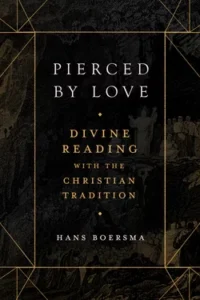
Divine Reading of Divine Scripture
Lectio Divina is nothing out of the ordinary. It is what happens naturally when Christians wrestle with the biblical text. The Latin term divina may intimidate us into thinking it is something different from what we typically do in reading the Bible. But divina does not mean “esoteric”; it is more akin to our term holy. The Scriptures are holy – set aside for a unique purpose. Scripture is divine in the sense that it has a special place within the church. Lectio divina simply means reading the Bible the way it’s supposed to be read – as divine Scripture.
Just as Scripture is divine, so our reading must be divine. Our reading must do justice to the purpose for which scripture has been set aside. Origen makes this point in a letter he probably wrote to Gregory Thaumaturgus around the year 235:
Devote yourself (proseche) first and foremost to reading the holy Scriptures (theion graphon); but devote yourself (proseche). For when we read holy things (theia) we need much attentiveness (prosoches), lest we say or think something hasty about them. And when you are devoting yourself (prosechon) to reading the sacred texts (theion) with faith and an attitude pleasing to God, knock on its closed doors, and it will be opened to you [Matt 7:7] by the gatekeeper of whom Jesus spoke: “The gatekeeper opens to him” (John 10:3]. And when you devote yourself (prosechon) to the divine reading (theia), uprightly and with a faith fixed firmly on God seek the meaning of the divine (theion) words which is hidden from most people. Do not stop at knocking and seeking, for the most necessary element is praying to understand the divine words (theia).
Two Greek words stand out in this brief excerpt from Origen’s letter. First is the term theios, which literally translated would yield the English “divine.” But the translator rightly uses the terms “holy” and “divine” interchangeably. Origen’s point is that holy books call for holy reading; divine books require divine reading.
T he second term is prosoche, or “attention.” Origen advises Gregory to read the biblical text with attention. Here, I’m somewhat less happy with the translator’s equation of attention with devotion. Devotion often carries the connotation of piety. Now, attention does include a pious attitude. But Origen probably had more in mind than just what we today call devotion. When monastic authors of the third and fourth centuries spoke of attention (prosoche), they had in mind vigilance, watchfulness, and self-awareness. The monk would watch his thoughts, making sure they were focused on God rather than on anything extraneous. Attention was the opposite, therefore, of distraction.
he second term is prosoche, or “attention.” Origen advises Gregory to read the biblical text with attention. Here, I’m somewhat less happy with the translator’s equation of attention with devotion. Devotion often carries the connotation of piety. Now, attention does include a pious attitude. But Origen probably had more in mind than just what we today call devotion. When monastic authors of the third and fourth centuries spoke of attention (prosoche), they had in mind vigilance, watchfulness, and self-awareness. The monk would watch his thoughts, making sure they were focused on God rather than on anything extraneous. Attention was the opposite, therefore, of distraction.
Origen wants Gregory to be attentive when he engages in divine reading. The Scriptures require his utmost attention. He cannot rush the reading, hurrying to quickly finish. No, divine reading requires his single-minded focus on the biblical text, for only such attention will allow him to find its hidden meaning.
Finding this hidden meaning is the purpose of reading the divine Scriptures. Again, we need not think of anything esoteric here. Origen simply has in mind the New Testament realities of Christ and the church. To read the Scriptures sacramentally is to look for Christ as the content of the biblical text. Click To TweetWhen we knock and seek, we look for the sacramental or real presence of Christ. Raymond Studzinski, a Benedictine monk from St. Meinrad Archabbey in Indiana, puts it this way: “For Origen everything in the Scriptures has meaning for Christian believers because of their life in Christ. Christ is the source, the content, and the meaning of the Scriptures.” To read the Scriptures sacramentally is to look for Christ as the content of the biblical text.
What is fascinating in Origen’s letter is that he makes absolutely no distinction between lectio divina and regular Bible reading. They are one and the same thing. Origen was hardly alone in this. When we discuss the twelfth-century Carthusian prior Guigo II in chapter 2, we will see that he links the four steps of lectio divina to the four traditional levels of biblical interpretation. For Origen and Guigo–and this holds true for the premodern Christian tradition more broadlylectio divina is the ordinary, standard way of reading the Scriptures. Proper biblical interpretation requires a divine or spiritual mode of treating the holy text.
The above excerpt is from the introduction of Pierced by Love: Divine Reading with the Christian Tradition by Hans Boersma. Published by Lexham Press, 2023. Used by Permission.

